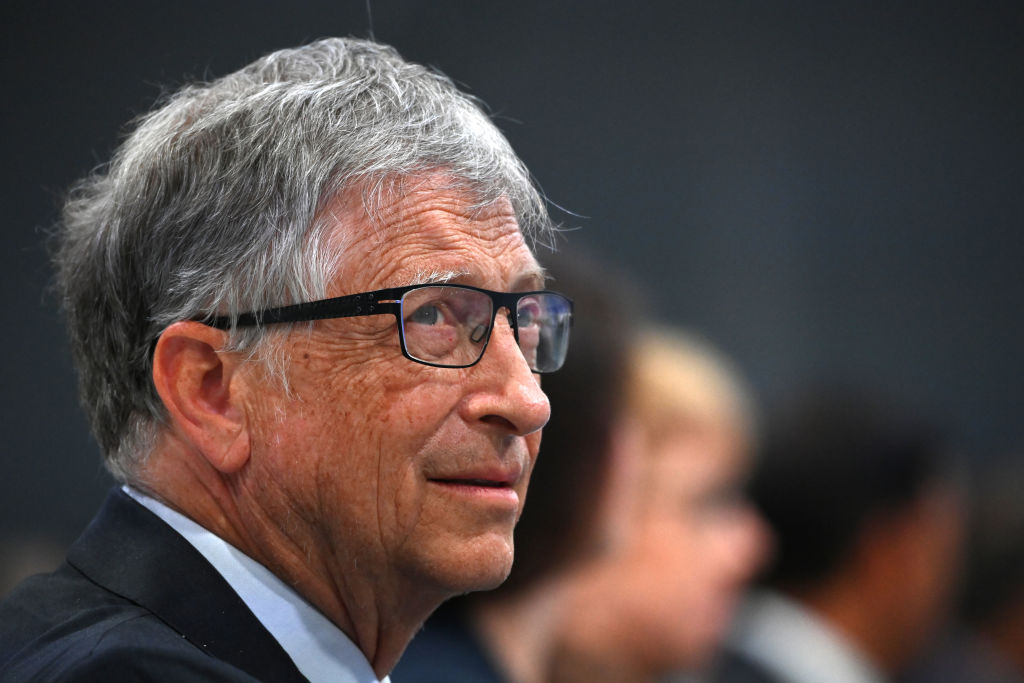
The COVID-19 pandemic has cost the global economy trillions of dollars. If the international community invested even a fraction of that money into things like disease surveillance, vaccine manufacturing and better medications, it would slash the chances of another, similar pandemic, philanthropist Bill Gates argued in a conversation with TIME.
Prior to the COVID-19 pandemic, “We lost our attention to the preparedness and we got lucky that some of the tools worked”—namely mRNA vaccines. We can’t rely on that kind of luck next time, Gates says.
Gates also discussed pandemic preparedness in a Nov. 8 speech at the Grand Challenges Annual Meeting, an event dedicated to finding solutions for major problems in global health and development. In his speech, he called for research into drugs and vaccines that can target multiple diseases; shots that are thermostable and longer-lasting than current COVID-19 vaccines; and shots that could deliver the equivalent of multiple doses at once. Gates also argued that countries need to invest in disease surveillance and vaccine manufacturing, particularly in regions where the current infrastructure is lacking.
Gates reportedly stepped down from Microsoft’s board last year during an investigation into his past relationship with a female employee. Gates’ spokespeople have said his resignation was unrelated to that matter and that he wanted to focus on philanthropy. He co-chairs the Bill & Melinda Gates Foundation with ex-wife Melinda French Gates.
At the Grand Challenges meeting, the Foundation pledged $50 million to support the work of scientists in low- and middle-income countries, with a particular emphasis on funding female investigators. It will also award grants of up to $1 million to 14 researchers in Africa.
Most Popular from TIME
TIME spoke with Gates to learn more about his vision for a post-pandemic future.
What has been the single-greatest lesson learned from the COVID-19 pandemic?
It’s very hard for governments to maintain capacity for things that don’t happen very often. They manage to do it for wars. Most other really bad things, there are small forms of them that remind you there can be a big one. You have small fires, small earthquakes.
[Before COVID-19] there were people, including myself, who were very specific about things that should be done [to prevent a pandemic]. Other than funding the Coalition for Epidemic Preparedness Innovations, very little was done. We got lucky that with mRNA technology … the very first successful vaccine was a pandemic vaccine.
We want rich countries to invest in new pandemic tools partly because of, of course, these millions of deaths and trillions of dollars [lost], but also because we see the investment in good surveillance and in any of these tools—diagnostics, therapeutics but particularly vaccines—as incredibly helpful even before the next pandemic comes along.
The Bill & Melinda Gates Foundation has worked with COVAX, the effort to equitably supply vaccines throughout the world that has not fully lived up to its promise. Should something like it stick around after this pandemic?
Typically on world problems, the U.S., both in terms of funding and expertise, plays a leading role. This was an unusual one, where the U.S. [did not originally take a leading role]. It did leave a bit of a vacuum. COVAX was created partly because of that lack of U.S. leadership. I don’t think we would do it the same way again.
The thing we need to do better next time is the surveillance piece, the dedicated pandemic preparedness team, say several thousand people, that does germ games, modeling, ongoing respiratory surveillance and who keep their skills fresh by working on things like malaria and measles all the time. Then they’re ready to work on any pandemic when there’s ever a hint of it.
While we’ve had a few recent advances in COVID-19 treatments, they’ve taken a long time. Why is that and how do we fix the problem?
The only disease we’ve done a good job on with antivirals is HIV and that’s kind of an amazing thing. Even on flu, we’ve done a terrible job. We can do broad-spectrum antivirals [that could work against multiple viruses]. That takes a mix of academia and the private sector to build those up. And how do you trial those very quickly?
[This time], the trials weren’t standardized. They were under-powered. It was hard to supervise in developing countries as the disease burden shifted. We get an F on the therapeutic front.
What has gone wrong on the testing front?
Nobody really thought through doing diagnostics for billions of people. The amount of invention required is almost zero at this point. We just need to get out there and constantly be tracking respiratory disease and doing autopsies and doing sequencing. I think of diagnostics and surveillance as one big thing.
You’re a famously optimistic person. What gives you hope when you think of the future of pandemic preparedness?
We lost trillions of dollars because we weren’t prepared [for this pandemic]. For tens of billions of dollars … you can invest [in things like surveillance, vaccines and therapeutics] and make the chance of this happening again extremely low. It’s an incredible bargain that will protect rich people from pandemics, but also allow us in global health—where the inequities are so dramatic, still to this day, despite the progress we’ve made—to have tools for things like malaria eradication, TB, HIV.
This interview has been lightly edited and condensed for length and clarity.
More Must-Reads from TIME
- Cybersecurity Experts Are Sounding the Alarm on DOGE
- Meet the 2025 Women of the Year
- The Harsh Truth About Disability Inclusion
- Why Do More Young Adults Have Cancer?
- Colman Domingo Leads With Radical Love
- How to Get Better at Doing Things Alone
- Michelle Zauner Stares Down the Darkness
Write to Jamie Ducharme at jamie.ducharme@time.com